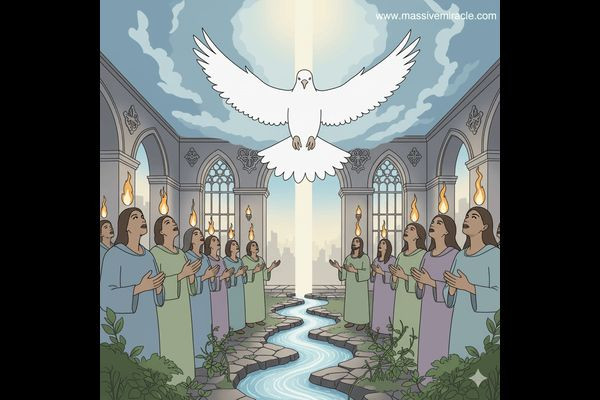What is the Holy Spirit? Exploring the Person, Power, and Presence of God
Introduction
The Holy Spirit is arguably the most dynamic, yet often misunderstood, member of the Christian Trinity.1 While God the Father is seen as the sovereign Creator and God the Son, Jesus Christ, is the visible Redeemer, the Holy Spirit is the invisible, ever-present, and active Spirit of God working within the world and, specifically, within the believer. Understanding who is the Holy Spirit is not merely a theological exercise; it is essential for comprehending Christian experience, divine revelation, and the very nature of God. The Bible clearly presents the Spirit not as an impersonal force, a mere influence, or a cosmic energy, but as the Third Person of the Trinity—a distinct, fully divine, and personal entity who executes the will of the Father and the Son. This article will embark on a comprehensive journey to answer the fundamental question: What is the Holy Spirit? We will explore His personhood, His divinity, His integral roles throughout Scripture, and His crucial work in the life of every believer, revealing the source of spiritual power and divine fellowship.
I. Defining the Holy Spirit: Personhood and Divinity
To grasp the truth about the Holy Spirit, we must first establish two foundational theological pillars: His Personhood and His Divinity.
A. The Personhood of the Spirit
The Spirit possesses all the qualities of a person, contradicting any notion that He is an abstract force.2 Scripture attributes personal characteristics and actions to Him:
-
He Speaks: The Spirit speaks to individuals and the Church (Acts 13:2; Hebrews 3:7).3
-
He Teaches: He guides believers into all truth (John 14:26).4
-
He Comforts/Counsels: Jesus calls Him the Paraclete or Counselor (John 14:16).
-
He Intercedes: He makes intercession for believers with groanings (Romans 8:26).5
-
He Can Be Grieved: Believers are commanded not to grieve the Holy Spirit (Ephesians 4:30), an act only possible toward a relational person.6
-
He Distributes Gifts: He exercises His will in distributing Gifts of the Holy Spirit (1 Corinthians 12:11).7
B. The Divinity of the Spirit (God the Spirit)
The Holy Spirit is not a lesser deity or an angel; He is fully God.8 This is affirmed through:
-
Divine Attributes: He is omniscient (knows all things - 1 Corinthians 2:10-11), omnipresent (can be everywhere - Psalm 139:7-10), and eternal (Hebrews 9:14).9
-
Divine Names: He is called the "Spirit of God" (1 Corinthians 2:11) and the "Spirit of the Lord" (Isaiah 61:1).10
-
Equality with the Father and Son: The command for baptism is given "in the name of the Father and of the Son and of the Holy Spirit" (Matthew 28:19), placing all three persons on the same divine level, establishing the doctrine of the Trinity. Peter tells Ananias that lying to the Holy Spirit is lying to God (Acts 5:3-4).11 This undeniable evidence solidifies the Spirit as the Third Person of the Trinity.
II. The Holy Spirit in the Old Testament: Creation and Prophecy
While the New Testament reveals the Spirit's fullest work, the Spirit of God was active from the very beginning.12 His work in the Old Testament primarily focused on creation and enablement for specific tasks:
-
In Creation: Genesis 1:2 describes the Spirit of God hovering over the waters, signifying His active role in bringing order and life out of chaos.13 This establishes the Spirit as the agent of divine action in the physical realm.
-
In Empowerment for Service: The Spirit would come upon certain individuals to enable them to accomplish divine tasks. This was a temporary anointing, not a permanent indwelling. Examples include:
-
Craftsmanship: Bezalel was filled with the Spirit to build the Tabernacle (Exodus 31:3).14
-
Leadership: The Spirit came upon judges (like Gideon and Samson) to give them military might and wisdom.15
-
Prophecy: Prophets were moved by the Holy Spirit to record and deliver God's message (2 Peter 1:21).16 This work ensured the infallible transmission of God's Word, demonstrating the Spirit's role in biblical revelation. The Old Testament thus introduces the Spirit as the source of divine power and wisdom.
-
III. The Holy Spirit and the Ministry of Jesus Christ (Approx. 200 Words)
The entire earthly ministry of Jesus was inaugurated, sustained, and completed by the Holy Spirit. This shows the perfect unity and cooperation within the Godhead:
-
Conception: The Holy Spirit overshadowed Mary, resulting in the miraculous conception of Jesus (Luke 1:35).17
-
Baptism and Anointing: The Spirit descended upon Jesus "like a dove" at His baptism (Matthew 3:16), signifying His public anointing for ministry.18 Jesus then began His ministry, stating, "The Spirit of the Lord is upon me, because he has anointed me..." (Luke 4:18).19
-
Empowerment for Miracles: Jesus performed His signs and wonders, including casting out demons, by the Spirit of God (Matthew 12:28).20
-
Resurrection: The Spirit was the divine agent who raised Jesus from the dead (Romans 8:11).
The life of Jesus provides the model for the Spirit-filled life: total dependence on the Spirit's power to fulfill God's will.
IV. The Role of the Holy Spirit in Salvation: Regeneration and Indwelling
The most personal and crucial work of the Holy Spirit happens when a person is saved. This work is absolutely indispensable for Christian salvation:
-
Conviction: The Spirit performs the critical work of convincing the world of sin, righteousness, and judgment (John 16:8).21 He breaks through human pride and self-justification, showing the need for a Savior.
-
Regeneration (The New Birth): Jesus told Nicodemus that one must be "born of the Spirit" (John 3:5-8).22 This is the act of the Spirit imparting new spiritual life to a soul that was dead in sin, transforming the person from the inside out.23 This Spirit of God is the agent of new creation.24
-
Indwelling: Upon saving faith, the Holy Spirit takes up permanent residence within the believer (Romans 8:9; 1 Corinthians 6:19).25 The believer's body becomes the temple of the Indwelling Spirit, providing a constant source of communion and divine presence.26
V. The Holy Spirit in the Life of the Believer: Sanctification and Assurance (Approx. 30 Words)
The presence of the Holy Spirit transforms daily life, moving beyond the moment of salvation to the lifelong process of becoming more like Christ.27 The Indwelling Spirit is the engine of Christian growth.28
VI. The Fruit of the Spirit and Sanctification (Approx. 200 Words)
-
The Spirit's work in producing character (Galatians 5:22-23).29
-
The contrast between the flesh and the Spirit-filled life.
-
Sanctification as a cooperative process empowered by the Spirit.30
VII. The Gifts of the Holy Spirit (Charismata)
-
Definition and purpose: Spiritual gifts for building up the church (1 Corinthians 12).31
-
Examples of gifts (prophecy, teaching, healing, service).
-
The Spirit's sovereign distribution of these gifts of the Holy Spirit.
-
The role of the Spirit in empowering ministry.
VIII. The Holy Spirit and the Church
-
Pentecost: The public outpouring of the Spirit (Acts 2) and the birth of the Church.
-
Guidance: Leading the Church's mission and direction (Acts 16:6-7).32
-
Unity: The Spirit creates oneness among believers despite diversity (Ephesians 4:3).33
-
Worship: The Spirit enables genuine, corporate worship.
IX. Practical Living: Being Filled with the Spirit
-
Understanding the command to be "filled with the Spirit" (Ephesians 5:18).
-
This is not a one-time event, but an ongoing submission.
-
The role of yieldedness, prayer, and reading the Word.
-
The Spirit of God as the source of our spiritual power for witnessing.
Conclusion
-
Summarize the identity of the Holy Spirit: fully God, fully personal, the Third Person of the Trinity.34
-
Reiterate His comprehensive work: creation, prophecy, anointing Christ, salvation, sanctification, and empowering the Church.
-
A final exhortation to seek and submit to the power of the Holy Spirit as the key to a vibrant Christian life.








